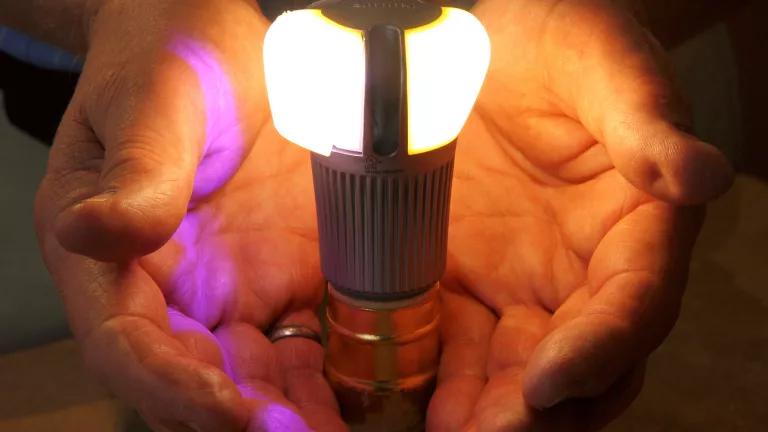Is the Rebound Effect for Real?
Energy efficiency is no fool’s game, no matter what you hear.

Rebound effect (n.): A theory that improvements in efficiency increase power consumption rather than reducing energy use
This year’s Nobel Prize for physics went to three scientists who made it possible to produce white light from LEDs. The newest light-emitting diodes claim to cast an astonishing 15 times more light per watt of electricity than the old-fashioned incandescent bulb (though commercially available ones can’t approach that yet). Electricity accounts for almost a third of U.S. greenhouse gas emissions. So reducing the contribution of lighting by 93 percent would be a dream.
Some people, in fact, think that’s all it is.
Why? Let’s take a trip back to the late 19th century, when technological breakthroughs made mining and processing coal much easier. Surveying the scene, English economist and renowned glass-half-empty-ist William Stanley Jevons predicted that those efficiency improvements would paradoxically increase coal consumption by driving down costs. Put simply: Coal is cheaper now, so we’ll burn more of it—and thus, need to mine more of it. This is known as the Jevons Paradox or, more dramatically, “the backfire theory.”
The rebound effect is a softer, more modern version of the Jevons Paradox, suggesting that increased consumption may not negate efficiency gains entirely, but it could cut into a large portion of the savings.
The rebound effect is so simply stated that, at first glance, it seems beyond dispute. When something gets cheaper, consumers buy more of it. People drive more when the price of gasoline drops. If you were offered a deal on home heating oil, you could nudge the thermostat northward. And if the cost of lighting your house suddenly dropped, you might make your rooms brighter and leave the lights on longer. Even if you didn’t use your electricity savings to buy more lighting, you might put it toward other energy-intensive activities, like long-haul vacations. That’s the theory, anyway.
If the rebound effect is real and strong, then improving energy efficiency would be a very inefficient way to reduce carbon pollution. But there is very little evidence to suggest that the effect is large, or even real, in many cases. According to data from the U.S. Department of Energy and the International Energy Agency, the rebound effect eats up less than 12 percent of lighting-efficiency improvements. According to the EPA, the effect in transportation is at most 10 percent—and probably more like 6 percent. And there is no effect at all when home appliances become more efficient. (You are not suddenly going to have more dishes to clean, socks to dry, and bread to toast.)

What have Jevons and his acolytes gotten wrong? We need far more research to be sure. It could be that price isn’t the main constraint on energy consumption. Perhaps your house is already as bright as you want it to be. There is also plenty of data suggesting that people in the developed world are driving less by choice rather than due to financial limitations.
And let’s not forget about conservation. Maybe people don’t want to lose that warm, fuzzy feeling that comes with buying an eco-friendly lightbulb by leaving the bulb on all night. Concern for future generations is something that our pessimistic prognosticator, Dr. Jevons, apparently hadn’t foreseen. If only he’d had a better light source.
This article was originally published on onEarth, which is no longer in publication. onEarth was founded in 1979 as the Amicus Journal, an independent magazine of thought and opinion on the environment. All opinions expressed are those of the authors and do not necessarily reflect the policies or positions of NRDC. This article is available for online republication by news media outlets or nonprofits under these conditions: The writer(s) must be credited with a byline; you must note prominently that the article was originally published by NRDC.org and link to the original; the article cannot be edited (beyond simple things such grammar); you can’t resell the article in any form or grant republishing rights to other outlets; you can’t republish our material wholesale or automatically—you need to select articles individually; you can’t republish the photos or graphics on our site without specific permission; you should drop us a note to let us know when you’ve used one of our articles.

Sea Level Rise 101
Shared Knowledge Is Power in the Northern Mariana Islands
What Are the Solutions to Climate Change?